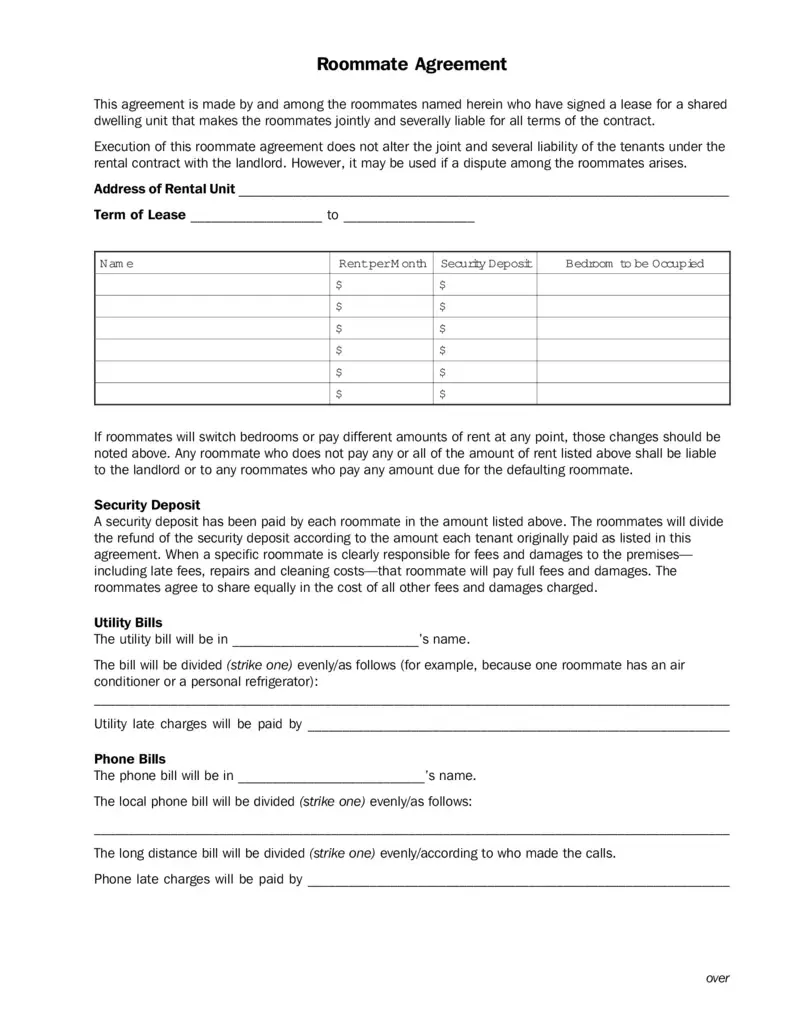A roommate agreement is a contract amongst individuals who share a living space and articulates in bold terms the rights and responsibilities of each of the parties concerned. In other words, such agreements give clearly defined sets of expectations concerning issues like rent payment, utility payment, household chores, and any other household duties which could probably prevent any possible misunderstandings or disputes. While they can vary in content and level of complexity, roommate agreements tend to be a very interactive way of establishing household rules in a shared dwelling. Before accepting a roommate, you need to be adequately informed about roommate agreement lest you end up with regrets. In this informative write-up, we will enlighten you about everything you need to know about legally binding agreements.
Legal Binding Effect of a Roommate Agreement
Roommate agreements are, by their very nature, legally binding. That is, they can be legally enforced through the courts. If your roommate fails to comply with the dictates of the roommate agreement, you can, therefore, take legal action against him, representing the legally binding agreements as your evidence in court. Nonetheless, particular clauses within them can be held to be unenforceable. For instance, financial responsibilities regarding rent and utility payment divisions are usually valid, but those clauses that dictate the division of chores most likely will not be treated as such by any court. The courts will not usually enforce those provisions that depend on one roommate doing something-for example, cleaning the bathroom twice a week.
That kind of agreement is generally too vague and subjective to be legally enforceable. In a nutshell, the basic financial terms in a roommate agreement likely will be legally valid, but other promises that are not monetary in nature, likely won't.
Roommates will be happy to learn that while a roommate agreement legally binds them, it does not affect their legal responsibilities to the landlord. The most important legally binding document between tenant and landlord would still be the rental agreement with the landlord. Should any dispute arise among the roommates about financial responsibilities or other conditions mutually agreed upon among them and an agreement among them cannot be reached, then a civil court or small claims court may have to intervene. In this respect, a written agreement may be very helpful as evidence because it makes clear the undertaking and expectations of each party.

Importance of Written Agreements
A written agreement between roommates is highly recommended for all persons in a shared living situation. The best agreement reduces the possibility of conflict because it clearly defines aspects such as rules for overnight guests, hosting parties, and gatherings, as well as expectations for noise control during quiet hours or study/sleep times. These agreements should also consider specific needs, such as accommodating religious or cultural customs.
A written agreement also provides a clear reference point in case disagreements arise. By documenting expectations upfront, roommates can avoid misunderstandings and ensure accountability. This transparency fosters trust and cooperation, leading to a smoother living arrangement. When everyone knows their responsibilities and the rules, it minimizes tension and promotes a peaceful, respectful environment.
Rules for guests: Agreements should define clear rules for hosting guests, including whether overnight stays are allowed and guidelines for parties or gatherings.
- It keeps the misunderstandings out: This is where it becomes imperative that a roommate agreement exists between people living. In it, the expectations from every person in terms of their respective responsibilities would not result in friction among the renters. Put more explicitly in the duties and legally binding agreements involved in such roommate situations, and then they need to be clearly outlined for no misconceptions.
- Encourages open communication: The very existence of a roommate agreement allows open communication about each other's preferences, schedules, and lifestyles. This will be helpful in constructing a considerate atmosphere where all the roommates will feel heard and appreciated; therefore, paving the way to spend a pleasant, peaceful time.
- Clearly outlines responsibilities: A good agreement between roommates articulates the responsibility of each to perform chores, pay the rent, and share the resources. This agreement helps to minimize the probability of disputes arising due to misconceptions over household duties since it will spell out who shall be responsible for what.
- Aids in having control over finances: This agreement can outline how the rent and utilities are to be shared, when payments are due, and how they must be made. This clarity allows all roommates to understand the financial expectations. It can help ensure that everyone pays their share in full and on time, avoiding the stress and potential conflicts caused by overdue payments, and ensuring smooth financial management throughout the living arrangement.
- Lays down house rules: Agreements should specify quiet hours to control noise levels, rules for music or gaming, and guidelines for keeping common areas clean. This promotes a respectful and cooperative living environment.
- Provides a framework for conflict resolution: The roommate agreement serves as a reference in case of disagreement or conflict. It could detail procedures concerning the handling of disputes that may come up or mediation steps to take if the situation blows out of proportion, thereby going a long way in keeping peace in the house.
- Security deposit protection: Here, the roommate agreement can explain how the return of security deposits shall be done when it comes to its termination. Such clarity in such an instance, when a roommate leaves earlier than others, needs to be elaborated on how the deposit shall be divided and on which terms it would be refunded.
Necessary Features in a Roommate Agreement
Check below for some of the necessary features that must be present in a roommate agreement that will make it legally binding:
- Personal information: The agreement should first introduce all the roommates' full names and contact information. This will ensure that clear identification of all parties, and thus accountability, is established.
- Property details: Describe the address of the rental property, specifying areas designated as a private-for example, bedrooms and common areas-for example, the kitchen and living room. This helps in setting boundaries and expectations in shared and personal areas.
- Rent and security deposit: Outline the total amount of rent, each roommate's portion, the due dates, and what happens concerning a security deposit: how much is collected and the terms of its return. This portion of the agreement is key in ensuring no conflict occurs about financial responsibilities.
- Utilities: Indicate what utilities, such as electricity, water, and internet, are included in the rent and how the cost of each will be shared among roommates. Spelling it out avoids misunderstandings over who pays for what.
- Cleaning responsibilities: State the cleaning responsibilities of each roommate concerning common areas such as kitchens and bathrooms, together with a cleaning schedule. That way, everyone contributes to cleanliness in one's living space.
- Religious or cultural practices: Include accommodations or considerations for any religious or cultural customs to promote respect among roommates.

FAQs
Q: Are roommate agreements legally binding?
Yes, roommate agreements are generally legally binding documents. They can be taken to court and enforced in the financial part, especially when one roommate refuses to pay his or her share of the rent or utility bills. Non-monetary clauses, those about chore responsibilities, probably will not be enforceable in court.
Q: What parts of a roommate agreement are enforceable?
Financial responsibilities under the agreement, such as who pays the rent and utilities, are typically legally binding. That is if a roommate fails to pay his or her share, the other roommates can sue under the agreement. However, those provisions that cover house cleaning or personal responsibilities may be considered too subjective and thus hard to enforce.
Q: Do roommate agreements affect the landlord-tenant relationship?
No, this is another effect that the agreement does not relate to. The lease of the landlord and the main tenant remains the principal legal agreement relating to the tenancy in question. Anyway, such roommate agreements are standalone deals for binding roommates to each other.
Q: Can there be clauses about doing chores in a roommate agreement?
While many roommate agreements do have household chore provisions, most such provisions are not legally enforceable. The courts will generally not interfere with personal relationships or disputes over cleaning schedules or the division of chores. Roommates are supposed to communicate openly with one another about expectations in these areas.
Final Thoughts
While roommate agreements, being a legally binding contract, do provide some context and framework for any shared living arrangement, they at least should serve to make roommates cognizant of what agreements cannot reasonably promise. That is to say, it is the financial requirements that the court can enforce, and everything else may not be valid in court. Generally speaking, drawing up a written agreement in draft detail would go a long way towards making them have great improvement in communication and cooperation among roommates and hence a decent living experience.
We recommend using PDF Agile's template center to create roommate agreements easily and efficiently. These templates are user-friendly and can save you time while ensuring you cover all necessary details.






